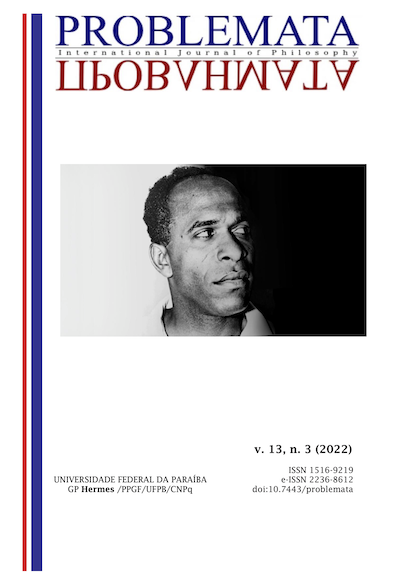SARTRE’S CRITIC OF HUSSERL’S TRANSCENDENTAL EGO
DOI:
https://doi.org/10.7443/problemata.v13i3.64402Keywords:
Sartre, Husserl, Phenomenology, Intentionality, TranscendentalAbstract
The Transcendental Ego is traditionally understood as responsible for unifying the multiplicity of apparitions seized by the subject. Sartre realizes that Husserl’s phenomenology helps us understand that intentional consciousness would not require the unifying pole. However, Husserl himself would make a transcendental turn, requiring this Ego – which himself has reject so far. Sartre would notice that husserlian’s phenomenology would make this Ego dispensable, showing us that the answer for the question about how consciousness would unify himself through the multiplicity of apparitions was already given in Husserl’s phenomenology. We intent to show in this paper that the resource to an I as an unifying pole would not be just unnecessary, but would also be an obstacle to understand the real meaning of intentionality as phenomenology would conceive - keeping in mind that the multiplicity of appearances would be unificated both internally, by the temporality, and externally, by the object pole.
Downloads
References
ALVES, M. S. Pedro. Irreflectido e Reflexão: Observações sobre uma tese de
Sartre. In: SARTRE, Jean Paul. A transcendência do ego. Trad. Pedro Alves. Lisboa: Colibri. 1994.
ALVES, M. S. Pedro. Consciência de imagem e fantasia. Ego de observação e ego de devaneio. Phainomenon, [S.l.], n. 16-17, p. 157-176, oct., 2008.
BELO, Renato Santos. Sartre e a tese da transcendência do ego. Griot: Revista de Filosofia, v.9, n. 1., p.159-180, jun. 2014.
BORNHEIM, Gerd. Metafísica e Existencialismo. São Paulo: Perspectiva. 2011.
HUSSERL, Edmund. Phänomenologische Psychologie: Vorlesungen Sommersemester 1925. Berlin/Heidelberg, Germany: Springer Science, Business Media Dordrecht, 1962.
HUSSERL, Edmund. Investigações Lógicas: Sexta Investigação. Trad. Zeljko Loparic. São Paulo: Abril Cultural, 1968 (Coleção Os Pensadores).
HUSSERL, Edmund. Phenomenological Psychology – Letters, Summer Semester, 1925. Trad. John Scanlon. The Hague, Netherlands: Martinus Nijhof, 1977.
HUSSERL, Edmund. A Ideia da Fenomenologia. Trad. Artur Morão. Lisboa: Ed. 70, 2000.
HUSSERL, Edmund. Analysis Concerning Active and Passive Synthesis. Trad. Anthony J. Steinbok. Illinois : Southern Illinois University at Carbondale, 2001.
HUSSERL, Edmund. Meditações Cartesianas e Conferências de Paris. Trad. Pedro. M. S. Alves. Rio de Janeiro: Forense Universitária, 2013.
HUSSERL, Edmund. Investigações Lógicas. Trad. Pedro M. S. Alves. Rio de Janeiro: Forense Universitária, 2015.
HUSSERL, Edmund. Ideias para uma fenomenologia pura e para uma filosofia fenomenológica: introdução geral à fenomenologia pura. Trad. Márcio Suzuki. Aparecida, SP : Ideias & Letras, 2016.
HUSSERL, Edmund. Lições para uma fenomenologia da consciência interna do tempo. Trad. Pedro. M. S. Alves. Rio de Janeiro: Via Verita, 2017.
LANDGREBE, Ludwig. The Phenomenology of Edmund Husserl: six essays. Trad. Donn Welton. New York : Cornell University Press, 1981.
MAYER, Noemi. Tension entre spontanéité et passivité dans l’étude sartrienne de l’émotion. Bulletin d’analyse phénoménologique VIII (Actes 5), p. 245-260, 1, 2012.
MOUTINHO, Luiz Damond. Sartre: Existencialismo e Liberdade. São Paulo: Moderna. 1995.
MOUTINHO, Luiz Damond. Sartre: Psicologia Fenomenologia. São Paulo: Brasiliense, 1995.
PAES, Gabriel Gurae Guedes. Os limites da fenomenologia na investigação do imaginário. Ipseitas, São Carlos, v. 1, n. 2, p. 76-92, jul./dez., 2015.
PIZELLI, Fabrício Rodrigues. O Estatuto da intencionalidade na obra A Transcendência do Ego de Jean-Paul Sartre. Primeiros Escritos, São Paulo, n. 10, 2020.
SARTRE, Jean-Paul. A Transcendência do Ego. Trad. Pedro M. S. Alves, Lisboa : Colibri, 1994.
SARTRE, Jean-Paul. O Imaginário. Trad. Duda Machado. São Paulo: Ática. 1996.
SARTRE, Jean-Paul. Intencionalidade: um conceito fundamental da fenomenologia de Husserl. In. SARTRE, Jean-Paul. Situações I. Trad. Cristina Prado. Prefácio de Bento Prado Jr. São Paulo: Ed. Cosac Naify, 2005.
SARTRE, Jean-Paul. A Imaginação. Trad. Paulo Neves. Porto Alegre, RS: L&PM, 2008.
SARTRE, Jean-Paul. A Transcendência do Ego. Trad. João Batista Kreuch. Introdução e notas Sylvie Le Bon. Petrópolis: Vozes, 2015.
SARTRE, Jean-Paul. O Ser e o Nada. Trad. Paulo Perdigão. São Paulo: Vozes. 2015.
RODRIGUES, Malcom Guimarães. Consciência e má-fé no jovem Sartre: a trajetória dos conceitos. São Paulo : Ed. UNESP, 2010.
SOUZA, Thana Mara. Da irredutibilidade e inseparabilidade entre a percepção e a imaginação em Sartre. Educação e Filosofia, Uberlândia, v. 32, n. 64, p. 311-338, jan./abr. 2018.
TOURINHO, Carlos Diógenes. A Retomada da Concepção aristotélico-tomista de ‘inexistência intencional’ e suas consequências na tradição filosófica de Brentano no final do século XIX e início do século XX. Crítica: Revista de Filosofia, v. 8, n. 27-28, p.184-197, abr./out., 2003.
TOURINHO, Carlos Diógenes. O Desafio Metodológico de Husserl, o Exercício da Epoché e o Estatuto Transcendental da Objetividade Fenomenológica. Revista Portuguesa de Filosofia, v. 71, n. 1, p.11-25, 2015.
TOURINHO, Carlos Diógenes. O Problema da Autoconstituição do Eu Transcendental na Fenomenologia de Husserl: de Ideias I a Meditações Cartesianas. Trans/Form/Ação, v.. 39, n. 3., p.87-100, jul-set, 2016.
ZAHAVI, Dan. Husserl’s Phenomenology. California : Stanford University Pres. 2003.
ZAHAVI, Dan. Phenomenological Mind. New York : Routledge, 2008.
ZAHAVI, Dan. Subjectivity and Selfhood: investigating the first-person perspective. Massachusetts : The MIT Press, 2005.
Downloads
Published
Issue
Section
License
Copyright (c) 2022 Tássia Vianna de Carvalho

This work is licensed under a Creative Commons Attribution 4.0 International License.
Authors who publish with this journal agree to the following terms:
- Authors retain copyright and grant the journal right of first publication with the work simultaneously licensed under a Creative Commons Attribution License that allows others to share the work with an acknowledgement of the work's authorship and initial publication in this journal.
- Authors are able to enter into separate, additional contractual arrangements for the non-exclusive distribution of the journal's published version of the work (e.g., post it to an institutional repository or publish it in a book), with an acknowledgement of its initial publication in this journal.
-
- Authors are permitted and encouraged to post their work online (e.g., in institutional repositories or on their website) prior to and during the submission process, as it can lead to productive exchanges, as well as earlier and greater citation of published work (See The Effect of Open Access).





